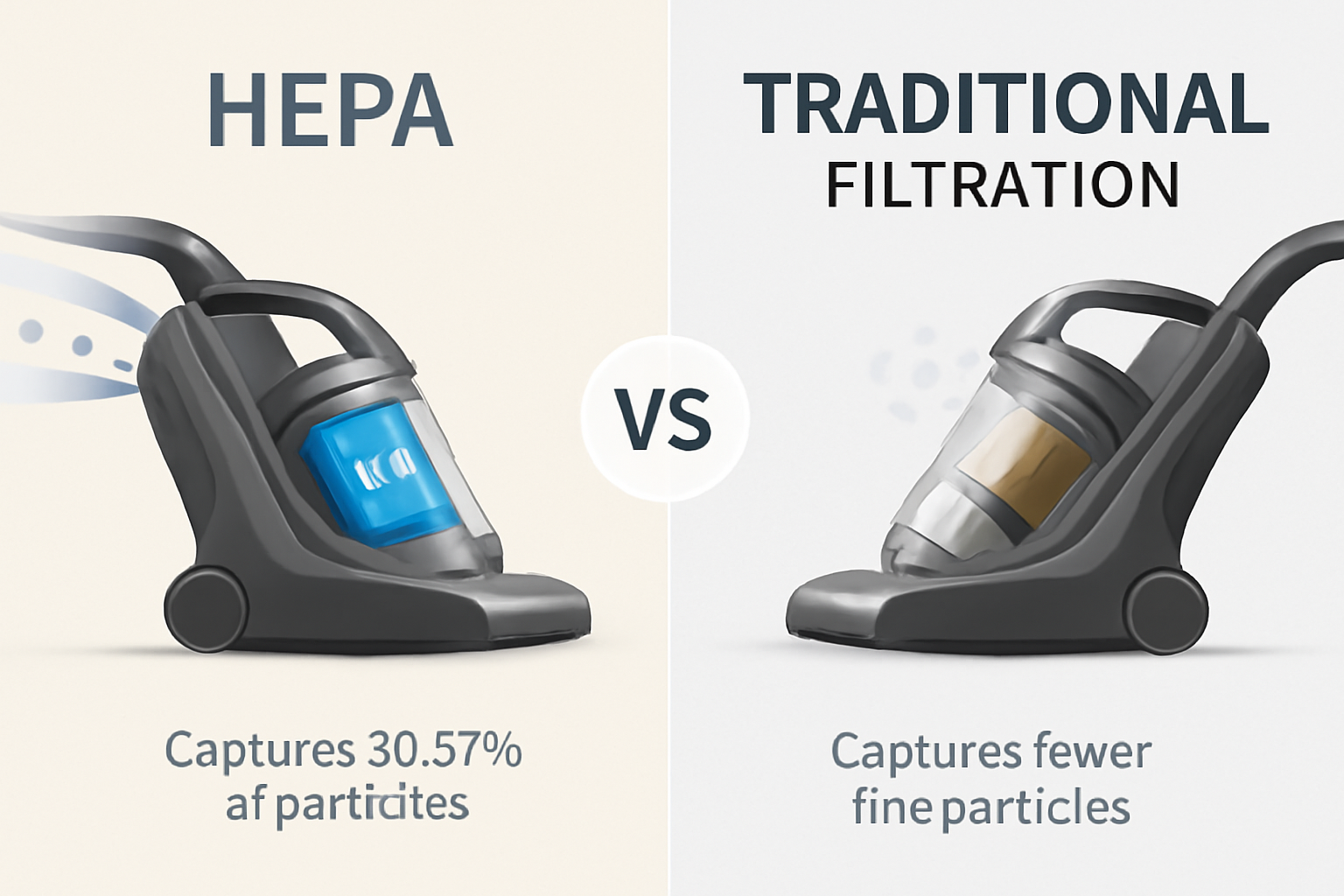Vacuum Cleaner Filtration Technology: HEPA vs. Traditional Filters
 When choosing a vacuum cleaner, one of the most important factors to consider is the filtration system. The type of filter in your vacuum can significantly impact the air quality in your home, especially if you suffer from allergies or asthma. In this article, we will compare HEPA filters to traditional filters, explaining the benefits and helping you decide which option is best for your cleaning needs.
When choosing a vacuum cleaner, one of the most important factors to consider is the filtration system. The type of filter in your vacuum can significantly impact the air quality in your home, especially if you suffer from allergies or asthma. In this article, we will compare HEPA filters to traditional filters, explaining the benefits and helping you decide which option is best for your cleaning needs.
1. What is a HEPA Filter?
HEPA (High-Efficiency Particulate Air) filters are designed to trap tiny particles in the air. These filters are able to capture 99.97% of particles as small as 0.3 microns, including dust, pollen, mold spores, and pet dander. HEPA filters are often found in vacuum cleaners that are marketed as allergy-friendly because they are extremely effective at improving indoor air quality by preventing these allergens from escaping back into the environment.
If you suffer from asthma or allergies, choosing a vacuum cleaner with a HEPA filter can be a game-changer. Leading brands like Miele offer models with HEPA filtration systems, ensuring that dust and allergens are effectively trapped inside the vacuum, leaving your home cleaner and healthier.
2. Traditional Filters: An Overview
Traditional filters, on the other hand, are typically made from materials like foam, fabric, or paper and are designed to capture larger particles like dirt and debris. While these filters can work well for everyday cleaning, they are not as effective at trapping smaller particles like allergens and bacteria.
Traditional filters are often less expensive and require less maintenance compared to HEPA filters, but they may not be the best choice if you're looking for superior air quality. Many budget-friendly models from brands like Bissell use traditional filters, which are sufficient for general cleaning tasks but may not be ideal for households with respiratory concerns.
3. The Benefits of HEPA Filters
Allergen Control: One of the main benefits of a HEPA filter is its ability to capture microscopic particles that can cause allergic reactions or exacerbate asthma symptoms.
Cleaner Air: Since HEPA filters prevent fine dust and allergens from escaping back into the air, they help improve the overall air quality in your home.
Better for Sensitive Individuals: For those who are particularly sensitive to dust, pet dander, or pollen, a HEPA vacuum is an essential tool for keeping your living environment healthy.
However, HEPA filters are generally more expensive than traditional filters, and they require regular maintenance to maintain their efficiency. They can also reduce airflow if they become clogged, which may affect the vacuum’s performance.
4. Why Choose Traditional Filters?
Affordability: Traditional filters are often much cheaper than HEPA filters, making them a cost-effective option for general cleaning.
Ease of Maintenance: Traditional filters are generally easier to clean and maintain, which can be an appealing option for those who do not need the specialized performance of a HEPA filter.
Good for Everyday Use: If your primary concern is simply picking up dust and dirt, a traditional filter can be sufficient for everyday cleaning needs. It’s perfect for homes that do not have specific air quality concerns.
5. How to Choose the Right Filter for Your Needs
For Allergy and Asthma Sufferers: If you or someone in your home suffers from allergies, asthma, or respiratory issues, a vacuum with a HEPA filter is highly recommended. This will ensure that the fine particles that could trigger symptoms are captured, leaving you with cleaner air and surfaces.
For Regular Households: If you don’t have specific allergy concerns, a traditional filter may be enough for your needs. For general cleaning tasks, a traditional filter will pick up dust, dirt, and debris without any issues, and it will likely be more affordable.
For Homes with Pets: Pet owners will benefit from a HEPA vacuum because it effectively captures pet hair, dander, and other fine particles that may be floating in the air. You can also find vacuums with specialized attachments to help with pet hair removal. Bissell offers vacuums designed specifically for homes with pets.
6. Conclusion
Ultimately, the choice between a HEPA filter and a traditional filter depends on your specific needs. If you prioritize cleaner air and are concerned about allergens, a HEPA vacuum cleaner is the best option for you. On the other hand, if you're looking for a more budget-friendly option for regular cleaning tasks, a traditional filter will likely meet your needs.
For more information on vacuums with HEPA filtration systems or other models, visit www.lxvacuum.com.

















